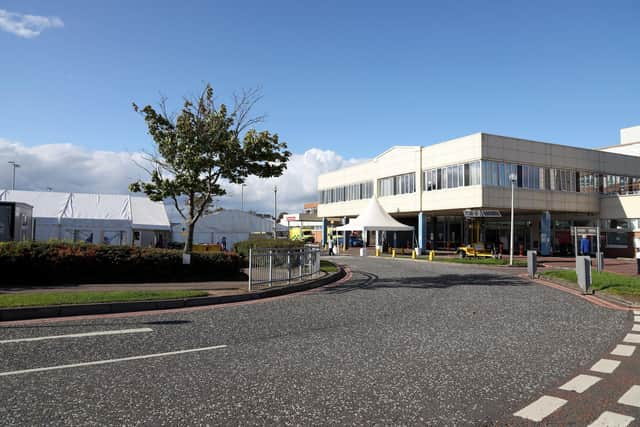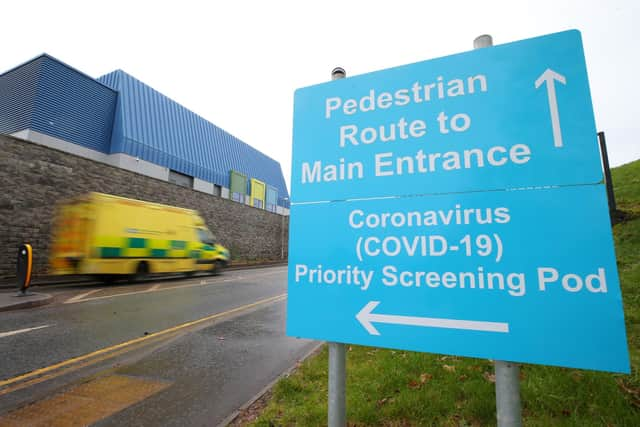Impact of outbreaks of Covid-19 in Craigavon Hospital and Daisy Hill Hospital in Newry which led to 15 patients dying was 'catastrophic'
and live on Freeview channel 276
During that time a total of 15 out of 32 patients died in both hospitals with the then Minister of Health Robin Swan announcing a Serious Adverse Incident (SAI) investigation.
Three years since, a report into the outbreaks revealed that in the Haematology Ward (Craigavon) half of the patients died (that is seven of the 14 patients with COVID-19); in the Male Medical Ward outbreak (Daisy Hill), six of the 13 patients with COVID-19 (46.2%) died and in the 4S Ward outbreak (Craigavon), two of the five patients with COVID-19 (40%) died. The age range of the deceased was 65-84 years. There were 11 men and four women.
Advertisement
Hide AdAdvertisement
Hide AdThough many of the patients had ‘severe pre-existing comorbidities and limited life expectancy’ prior to getting COVID-19, the panel concluded that COVID-19 appears to have contributed to the premature death of 12 of the 15 infected patients.


The report found that during these outbreaks Covid-19 infection in the community was ‘relatively low but rising’. It said: “The impact of the outbreaks was catastrophic, with profound implications for the patients, families and healthcare workers involved. It resulted in the loss of loved ones, treatment delays, extended admissions and prolonged effects in some patients and healthcare workers. Patients, families and healthcare workers also reported ongoing emotional impacts of the outbreak.
"At the time of the outbreak, in keeping with national guidance, patients were screened for COVID-19 on admission. However, there was no screening of inpatients or healthcare workers at regular intervals. The absence of such screening hampered early detection of HA-COVID-19 (hospital acquired) and the implementation of control measures in advance of the spread of infection.”
The report also found there were ‘insufficient and inadequate isolation facilities, poor ventilation on the wards, overcrowding and inadequate space for social distancing’ in the Emergency Department at Craigavon Hospital and on the affected wards. It also found that the relaxing of restrictions for ward visits at the time of the outbreaks and the use of fans are ‘likely to have contributed to the outbreak’.
Advertisement
Hide AdAdvertisement
Hide AdBoth Craigavon and Daisy Hill hospital buildings came in for criticism with the panel describing ‘several deficiencies’ including the physical condition, functional suitability, compliance with standards and lack of effective space utilisation. “All contributed to the likelihood of transmission of infection on the wards.” It further pointed out wards have few single rooms, with only some having en-suite facilities plus insufficient ‘negative pressure isolation rooms’. Toilets and shower facilities are limited. "With the exception of Haematology Ward, where the space between the beds was adequate, multi-bed bays in other wards have poor bed spacing and do not reflect current standards. This was the case particularly in the MMW and 4 South” the report concluded.


"The panel found instances of inconsistent and inadequate communication with patients, families and healthcare workers. In many cases, there were no records of communication of COVID-19 test results to the patients or their families. Similarly, both patients and their families were provided with little specific information regarding the outbreaks, which may have led to confusion regarding isolation requirements and visiting restrictions.
"The panel observed that patient transfers between hospitals (separated by nearly 25 miles) had an impact on the continuity of patient care for conditions unrelated to COVID-19 and also adversely impacted on the patient and family experience.”
The report also outlined ‘overcrowding’ in the Emergency Department in Craigavon Area Hospital which led to difficulties in managing social distancing. “Poor ward environments exacerbated difficulties in managing social distancing for patients and healthcare workers,” it said.
Advertisement
Hide AdAdvertisement
Hide Ad"Inconsistent and inadequate information was provided to patients and family regarding the outbreaks. The Trust provided general information regarding COVID-19 but did not always provide specific information to patients regarding the outbreak on the wards and the implications for patients, families or their visitors. No formal outbreak reports had been written following the outbreaks. These would have facilitated reflection and learning at ward level.
"Families and patients commented on delays in accessing care; the lack of continuity of care as a result of transfers between wards and hospitals; prolonged hospital stays, too many visitors on the wards, overcrowding and lack of social distancing amongst healthcare workers and patients, improper use of PPE, poor infection control practice, excessive use of temporary healthcare workers, and poor communication.
"Healthcare workers commented on the poor state of the wards and poor ventilation, the inability to maintain adequate social distancing on the wards and in healthcare workers' facilities, inadequate and inappropriate supply of PPE, excessive number of visitor, difficulties in trying to keep up with changing and sometimes conflicting infection control guidance, and poor communication regarding the progress of the outbreaks.”
Furthermore the report found ‘no association between nursing staff levels and the outbreaks’.
The report said: "The panel found instances of inconsistent and inadequate communication with patients, families and healthcare workers. In many cases, there were no records of communication of COVID-19 test results to the patients or their families. Similarly, both patients and their families were provided with little specific information regarding the outbreaks, which may have led to confusion regarding isolation requirements and visiting restrictions.
Advertisement
Hide AdAdvertisement
Hide Ad"In the panel’s view, at the time of the outbreak, incomplete and evolving understanding of the transmission of COVID-19, together with limited availability of rapid point of care diagnostic tests, inadequate isolation facilities, poor ventilation, absence of routine screening for COVID-19 of in-patients and healthcare workers and the non-availability of vaccines, made it difficult to prevent transmission of COVID-19 in the affected wards.
It noted that the lack of effective communication was ‘appalling’ with pertinent information regarding the outbreaks learned via the news. A number of patients were discharged home with no knowledge of the outbreak, resulting in family members contracting the infection. There were difficulties accessing the ward/healthcare workers for up to date information on family members.